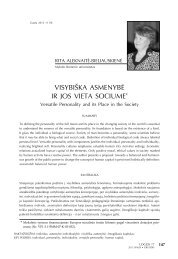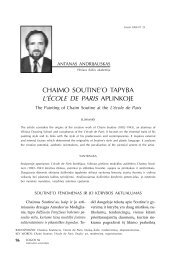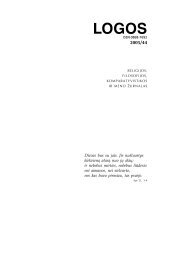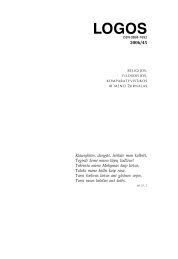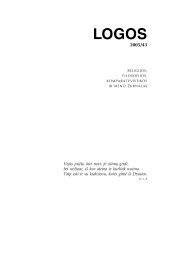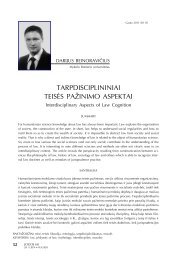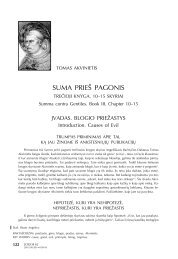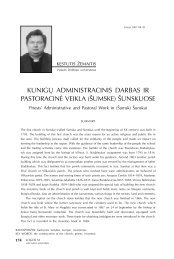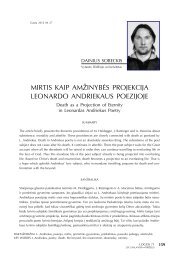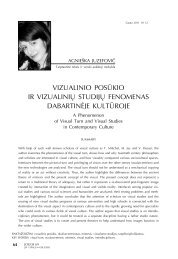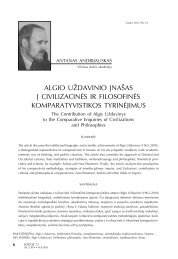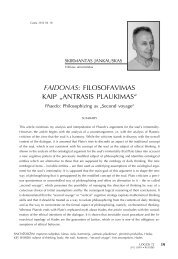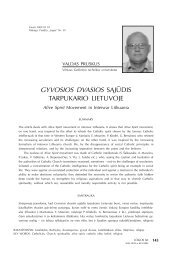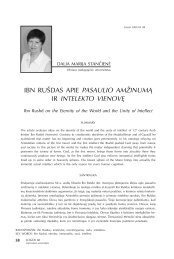Bet kvailas žmogus įgis supratimą, Kai laukinė a - Logos
Bet kvailas žmogus įgis supratimą, Kai laukinė a - Logos
Bet kvailas žmogus įgis supratimą, Kai laukinė a - Logos
Create successful ePaper yourself
Turn your PDF publications into a flip-book with our unique Google optimized e-Paper software.
DALIA MARIJA STANÈIENË<br />
98<br />
MALEBRANCHE‘O DEKARTIÐKOJI<br />
DIEVO PAÞINIMO SAMPRATA<br />
The Cartesian Concept of God‘s Cognition by Malebranche<br />
LOGOS 42<br />
2005 BALANDIS • BIRÞELIS<br />
DALIA MARIJA STANÈIENË<br />
SUMMARY<br />
In this article the Cartesian concept of God‘s cognition is considered. Malebranche‘s main argument<br />
on behalf of God‘s existence is an ontological one, taken from the Fifth Cogitation of Descartes. Malebranche<br />
claims that his own epistemology is based on the statement that God is seen in this life. He<br />
tries to prove this statement relying on the sight of cognisable magnitude. He modifies the epistemology<br />
of Descartes, which claims that the cognising subject has innate ideas in the depths of his soul.<br />
These innate ideas, according to Descartes, assist in creating acquired ideas from the data of sense<br />
perception. But according to Malebrance, the cognising subject is not able to control the process of his<br />
own thinking and to create a comprehensible object by means of acquired ideas. The subject is able to<br />
do the only thing, i.e. to pay attention to ideas and their relations which belong to God. Hence, Malebranche<br />
preaches absolute theocentrism. His theory is a considerable achievement in the development<br />
of epistemology.<br />
Malebranche‘o filosofiniuose veikaluose<br />
tikëjimas uþima svarbià vietà. Teiginiu<br />
„Norint bûti tikinèiuoju, reikia gyventi<br />
aklai, taèiau norint bûti filosofu,<br />
reikia aiðkiai matyti“ 1 , jis siekia ne suprieðinti<br />
religijà ir filosofijà, bet paska-<br />
Vilniaus pedagoginis universitetas<br />
PRATARMË<br />
RAKTAÞODÞIAI. Malebranche‘as, Descartes‘as, Dievas, idëja, paþinimas, siela.<br />
KEY WORDS. Malebranche, Descartes, God, idea, cognition, soul.<br />
Gauta 2005-04-18<br />
tinti tikinèiuosius, kurie yra ir filosofai,<br />
patirti savo tikëjimo akivaizdumà. Pritardamas<br />
Aurelijaus Augustino minèiai<br />
dël tikëjimo vaidmens paþinime 2 , Malebranche‘as<br />
aiðkino, kad tikëjimas gali<br />
padëti protui ið anksto, nurodydamas



